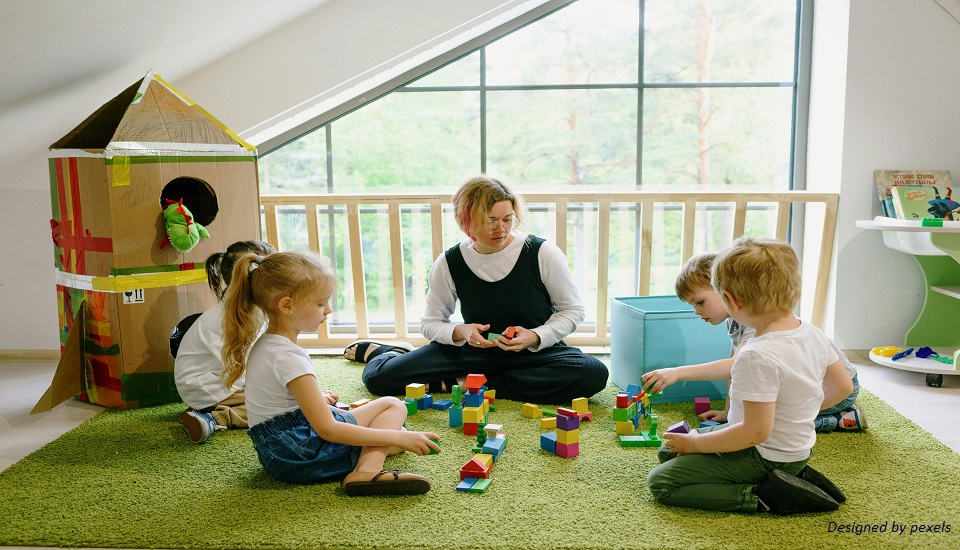Unstructured play isn’t idle downtime; it’s where preschoolers learn to lead, reflect, and grow. Teacher-preparation programs like a pre-primary teacher training course online emphasize the power of unstructured time in building autonomy, creativity, and emotional resilience. Research shows that these organic moments, where children choose their activities, pace, and materials, foster deep learning far beyond structured instruction.
Why Unstructured Time Matters
In preschool settings, unstructured time is where curiosity blossoms. These self-directed moments develop planning, emotional regulation, and decision-making skills, all essential for lifelong learning.
Here are a few ways you can utilize unstructured time for students:
1. Supporting Autonomy
When children can determine what and how to play, they build confidence and a sense of ownership over their learning. Educators can facilitate this by offering loose parts—like blocks, cardboard, natural materials, or art supplies—that inspire open-ended exploration. By stepping back and observing, teachers allow children to initiate and sustain rich learning experiences.
2. Materials That Spark Learning
The choice of materials is central. A well-designed environment offers a combination of purposeful, natural, and open-ended resources—magnetic tiles, cardboard boxes, stones, pine cones, felt boards, and everyday recyclables. These loose parts encourage problem-solving, imagination, and cross-disciplinary learning, from counting and sorting to dramatic play.
3. Elevating Unstructured Moments Through Observation
Teachers can elevate learning by observing and reflecting alongside children. Rather than interrupting, educators can ask thoughtful questions such as:
- ‘That construction is fascinating—what inspired you to do it this way?’
- ‘Can you teach me how you built that?’
These reflective conversations help children articulate their thinking and build metacognitive awareness.
4. Powerful Learning Through Play
Unstructured play supports several types of development:
- Cognitive growth: Planning a block structure or negotiating with peers strengthens executive functioning.
- Emotional control: Working through challenges and adapting plans builds resilience.
- Language skills: Social play encourages negotiation, storytelling, and vocabulary development.
- Social competence: Play encourages sharing, collaboration, leadership, and empathy.
These skills emerge when children are given space to follow their interests, rather than being led through adult-directed tasks.
5. Integrating Play Across the Day
Unstructured learning doesn’t need a special block; it can be woven throughout the day. Small windows during transitions or a daily 20–30 minute ‘choice time’ period provide consistent opportunities for child-directed exploration.
Thoughtfully arranged play corners, math, sensory, dramatic, art, blocks, and science invite continuous discovery. In these visually organized spaces, children naturally flow from one center to another, using curiosity and creativity to guide their learning.
6. Teacher Role: Guide, Not Director
During unstructured time, educators act as observers and gentle facilitators. This means documenting play through notes, photos, or child quotes, and then sharing these reflections with the class. This practice supports metacognition, self-awareness, and vocabulary.
Practical Ideas to Fuel Learning During Free Play
Here’s how educators can creatively promote learning in open-ended moments:
- Set up loose parts stations with varied natural and recycled materials.
- Allow slow transitions, letting children linger on tasks instead of rushing to the next activity.
- Observe deeply, using documentation to reflect and guide future learning.
- Ask open-ended questions that prompt children to explain, reflect, and elaborate.
- Design intentional play prompts that integrate math, literacy, or science without direct instruction—e.g., fabric trays that dovetail into dramatic play and measurement.
Celebrate diverse play styles, such as solitary builders, onlookers, dramatists, or cooperative creators. Recognize and validate what each child brings.
Bottom Line
Unstructured time is not an educational gap; it’s a powerful learning zone where children engage, imagine, and self-construct knowledge. Curricula that support this philosophy are increasingly found in pre- and primary teacher training courses, equipping educators to blend play and pedagogy with purpose and confidence.
Written By : Abhishek


